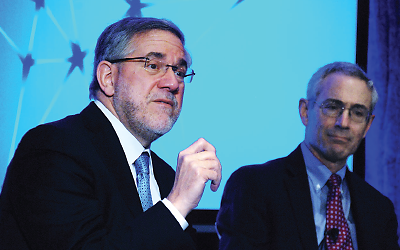Despite Brain Research Advances, Significant Challenges Remain
Abstract
Great strides have been made in brain research, but the pace of progress is threatened by cuts to the budgets of federal research agencies.
Research into the workings of the brain and its disorders has made great progress, but transferring that knowledge from the lab to the clinic is a slower process, current and former federal health research officials told the Kennedy Forum Inaugural Conference in Boston in October.
“This is a remarkable era for research into the brain and behavior,” said Steven Hyman, M.D., director of the Stanley Center for Psychiatric Research at the Broad Institute and Harvard University Distinguished Service Professor of Stem Cell and Regenerative Biology.
One valuable trend has been the development of new technologies such as neuroimaging and optogenetics that are permitting more advanced interrogation of the brain, said Hyman, who is a former director of the National Institute of Mental Health (NIMH).
“In the last decade we’ve seen extraordinary advances not only in human imaging but also in development of animal models and our ability to understand what brain circuits are doing,” he stated.

Steven Hyman, M.D. (left), and Thomas Insel, M.D., discuss advances in brain research and mental illness at the Kennedy Forum Conference in Boston.
“Great advances in science depend much more on new tools than on new concepts,” agreed current NIMH Director Thomas Insel, M.D., quoting physicist Freeman Dyson.
As a result, scientists now understand how much more they need to know and are more aware of the scope of the scientific universe they face, he said. “A decade of discovery science has bumped the number of known neurotransmitters from about 100 to more than 30,000.”
Continuing that pace of discovery means attracting and keeping young researchers in the field of brain research. More young scientists are drawn to neuroscience, but retaining them is hampered by funding cuts, said Insel. “The [National Institutes of Health] budget has lost 25 percent of its purchasing power, so a lot of good ideas don’t receive grant support.”
One critical new research tool is open access to datasets—a policy decision that augments technology, observed Nora Volkow, M.D., director of the National Institute on Drug Abuse.
Open access has allowed researchers in diverse areas of science to collaborate in addressing whole systems rather than merely isolated elements of the brain, she said.
“But that approach requires a new type of scientist, one with a background in modeling mathematics, because the statistical tools that we used in the past are inadequate,” said Volkow. “We build complexity out of simple models and their interaction into networks that ultimately generate complex systems.”
Hyman pointed out that in recent decades, consumer-advocacy groups have pushed scientists to solve problems and cure specific diseases. Yet dividing research into competing silos is not helpful given the current knowledge of overlapping risk genes for various mental illnesses and other conditions, such as intellectual disability.
Tightening the loop between research and clinical application could mean gathering more data from the latter as well as the former, Insel suggested. “Why not put a scientific payload into every service-delivery system so that we learn from what we’re doing?”
Ultimately, researchers must generate knowledge so clear that it can’t be ignored and moves policymakers and guideline writers to change clinical practice, said Volkow. “That is the strategy we have used in the substance-abuse field, and it has slowly started to work.”
Finally, influencing clinical practice will mean greater understanding about the ways in which health care practitioners learn and incorporate information into day-to-day use, said Hyman. ■
More information about the Kennedy Forum is posted at http://thekennedyforum.org.



